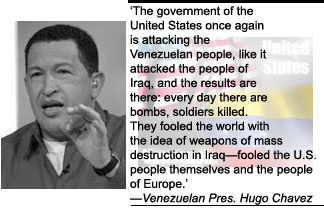Venezuelan president says U.S. played key role in ’02 coup attempt
By Humberto Marquez | Last updated: Mar 5, 2004 - 5:35:00 PMWhat's your opinion on this article?
- How to Overthrow A Government: The 2002 Attempted Coup in Venezuela (Democracy Now, 03/05/2004)
- U.S. - Venezuela: From hostile rhetoric to the brink of confrontation (FCN, 02/042004)
- Venezuela FOIA documents (VENEZUELAFOIA.INFO)

Pres. Hugo Chavez
|
Washington "has continued using the money of the people of the United States to finance conspiratorial activities, and I demand respect for Venezuela," Pres. Chavez said in a Feb. 17 speech to small business owners in Caracas.
According to the Venezuelan leader, the coup that removed him from power for two days in April 2002 "was backed by the government of Washington, there is no doubt about it. They met with coup-leading military officers, and the U.S. military participated in the coup."
"The government of George W. Bush must respond to the world for the blood that ran in Venezuela on April 11, 12 and 13 in 2002," when dozens of people died in the tumult that accompanied the first major demonstrations of opposition against the president, and the subsequent protests that put him back in power.
The tone of public confrontation between Caracas and Washington has been heating up since January while Venezuela’s National Electoral Council (CNE) determines the validity of 3.4 million signatures gathered by the opposition coalition, known as the Democratic Coordinator, to request a referendum on Mr. Chavez’s presidential mandate.
This constitutional process is being monitored at the CNE offices by observers from the Organization of American States (OAS) and from the U.S.-based Carter Center for Peace, with the ad hoc "group of friends"—Brazil, Chile, Mexico, Portugal, Spain and United States—serving as guarantors.
Pres. Chavez was riled by the Feb. 16 visit to Caracas of U.S. Deputy Secretary for Western Hemisphere Affairs, Peter DeShazo, who said Washington has "supported groups identified with the government and groups that are not. Both sides have received funds."
According to the U.S. official, he made the trip to Venezuela to follow the signature verification process for the referendum, and supported the recommendations of the OAS and Carter Center representatives, who said that in examining the signatures, "the signer’s will and intention should be privileged over any technicality."
Pres. Chavez said that Mr. DeShazo "is lying shamelessly. I challenge him to state which government-affiliated associations that support the government have been given money from the United States," and he went on to name the opposition groups that have received U.S. funds.
"The government of the United States once again is attacking the Venezuelan people, like it attacked the people of Iraq, and the results are there: every day there are bombs, soldiers killed. They fooled the world with the idea of weapons of mass destruction in Iraq—fooled the U.S. people themselves and the people of Europe," said the Venezuelan president.
"They are plotting a trick in Venezuela, saying there are guerrillas here. All that is lacking is that they say Osama Bin Laden is hidden here," he said.
He asked Washington "to focus on its own problems, to deal with its own poverty. It is no business of theirs what happens in Venezuela. If there is something positive we do with the United States, it is that every day we send 1.5 million barrels of petroleum, and our company Citgo has 17,000 gasoline service stations there."
He also criticized Mr. DeShazo’s comments about "technicalities" in the referendum signatures, because "it is no technicality to have people who died 20 years ago or minors sign the petitions."
According to Pres. Chavez, "The opposition in Venezuela is directed from Washington, and when DeShazo comes here, it is to see how his subordinates are doing."
The U.S. embassy in Caracas did not issue any statements on his remarks.
In November 2001, when Pres. Chavez criticized the U.S. bombing of Afghanistan and showed on television photos of the Afghan children killed in those attacks, Washington temporarily recalled its ambassador at the time, Donna Hrinak.
In January, several top Washington officials expressed concern about the political situation in Venezuela, and Pres. Bush, during a meeting with Mexico’s President Vicente Fox, reportedly said the United States would work with the OAS to ensure the integrity of the recall referendum process in Venezuela.
Venezuela’s Vice President Jose« Vicente Rangel, after meeting with Mr. DeShazo Feb. 16, said the U.S. official had indicated that "for the international community and for the United States, the position of the OAS and the Carter Center would be definitive."
Pres. Chavez responded: "Venezuela is an independent country. The arbiter here is not the OAS or Washington. The arbiter is the Electoral Council."
The CNE has set aside, for scrutiny, petitions containing approximately 1.9 million signatures. If they are rejected, the opposition will not have reached the 2.4 million required by the constitution to convene the referendum on whether Pres. Chavez should remain in office.
INSIDE STORIES AND REVIEWS
-
-
About Harriett ... and the Negro Hollywood Road Show
By Rabiah Muhammad, Guest Columnist » Full Story -
Skepticism greets Jay-Z, NFL talk of inspiring change
By Bryan 18X Crawford and Richard B. Muhammad The Final Call Newspaper @TheFinalCall » Full Story -
The painful problem of Black girls and suicide
By Charlene Muhammad -National Correspondent- » Full Story -
Exploitation of Innocence - Report: Perceptions, policies hurting Black girls
By Charlene Muhammad -National Correspondent- » Full Story -
Big Ballin: Big ideas fuel a father’s Big Baller Brand and brash business sense
By Bryan Crawford -Contributing Writer- » Full Story






 Click Here Stay Connected!
Click Here Stay Connected!








